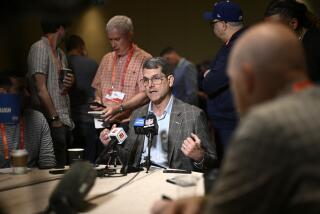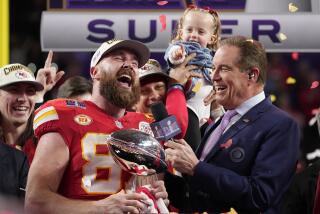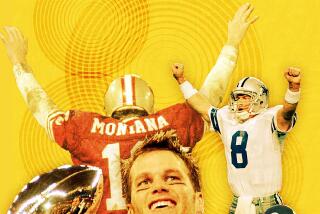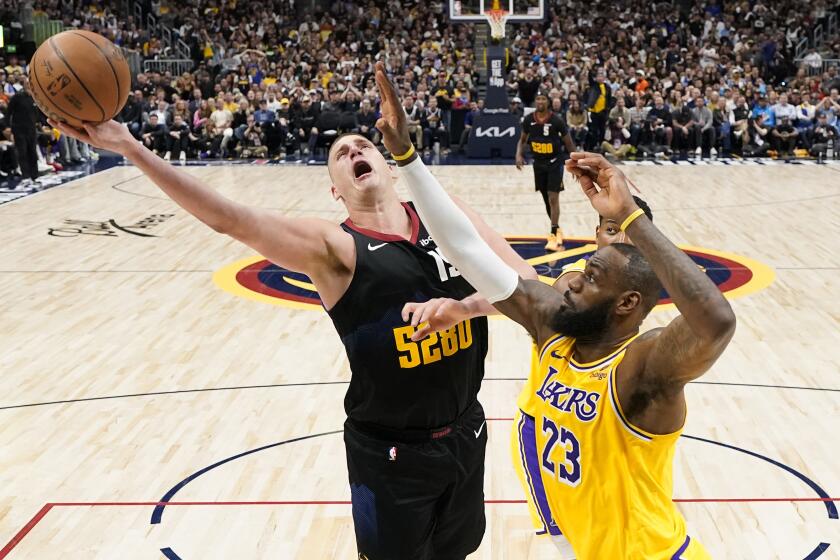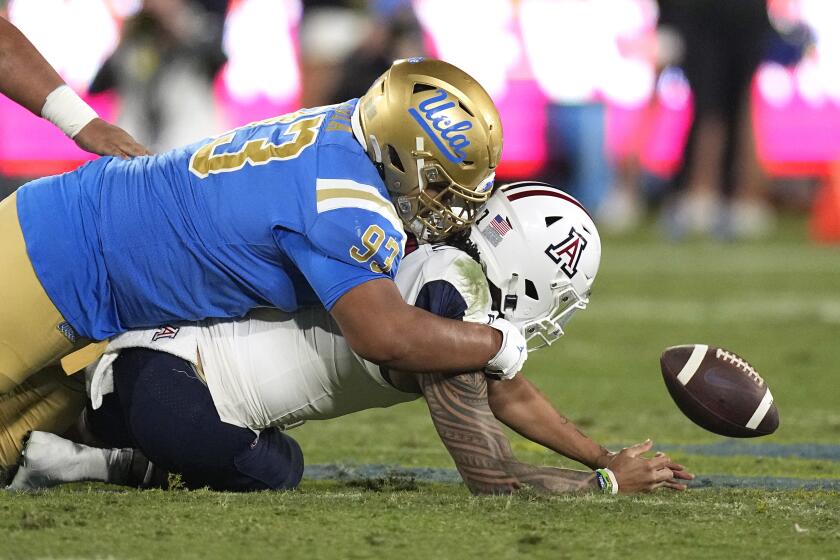The Top Five
As the 2005 playoffs arrive to put an end to an NFL regular season famous for widespread parity, one dominating question is obvious: How did five of the 32 pro clubs manage to rise so far above the crowd?
The best answer is that five unique players have pushed five good teams to the top. They are NFC wide receiver Terrell Owens and four AFC quarterbacks: Tom Brady, Ben Roethlisberger, Peyton Manning and Drew Brees.
In each instance, a sound, veteran coach was lost until he found the player who has changed his life.
Thus at New England, it took Brady to convert the NFL’s best coach, Bill Belichick, into a winner.
Similarly, Pittsburgh Coach Bill Cowher had built an all-around powerhouse that needed only Roethlisberger. At Indianapolis, Coach Tony Dungy is a defensive expert who lacked only Manning. San Diego’s Marty Schottenheimer, a running coach until LaDainian Tomlinson was injured, became a passing coach after, at long last, he saw what Brees can do. The Philadelphia leader, Andy Reid, knew he’d finally be in a Super Bowl — and a potential winner there — with Owens, the NFL’s best player, whose injury kills the Eagles again.
Steelers First? Chargers Viable Longshot
THE BIG SHIFT in pro football coaching — and hence in pro football — began in 2002 when, in Super Bowl XXXVI, Kurt Warner of the Rams and a new Patriot quarterback named Brady showed Belichick what passing can accomplish. Formerly a run-and-defend coach, Belichick has been a pass-offense enthusiast ever since, winning a second Super Bowl with Brady.
At San Diego, another conservative, Schottenheimer, continued as a run-and-defend coach until this season when, in an early-fall game, he temporarily lost his runner, Tomlinson, to an injury. Lacking a lot of options, he began depending on Brees, who in his first three Charger years had never impressed the head coach. This season, Schottenheimer, on the hot seat himself, had no real choice but to let Brees throw, and the rest is history — though as a coach he hasn’t had as long as Belichick to prove his commitment to pass offense.
It helped that one of his San Diego assistants is Cam Cameron, who as offensive coordinator has done as much for Schottenheimer as New England offensive coordinator Charlie Weis has for Belichick. Though a running-play expert, Cameron is an experienced offensive coach who has constructed a sound pass offense for Brees, using him in pass-first situations frequently and cashing in on his faith in the former Purdue quarterback.
On the eve of the playoffs, it isn’t a sure thing that either of the conventional coaches, Cowher or Dungy — both of whom are blessed with gifted passers — will outlast all three of the passing coaches, Belichick, Schottenheimer and Reid (who still has Donovan McNabb if not Owens). But the football world seems to be figuring Cowher & Roethlisberger first, just ahead of Belichick & Brady and Dungy & Manning. The Chargers are seldom listed as what they are: a strong, viable longshot pick.
Best Players Not in Best Offense
THE NFL’S ONE unreconstructed conservative who if he embraced pass offense could run away from everybody is Cowher, who at Pittsburgh has the league’s best players and one of its worst offenses, and who, after a bye this week, will face two of the NFL’s three best passing teams later this month.
As it happens, Cowher has a passer who can match bullets with Brady, Brees, Manning and McNabb though he’s still being held firmly under wraps. That is Roethlisberger, the undefeated, 6-foot-5, 242-pound rookie from Miami (Ohio) who — when the Pittsburgh running game has been insufficient — has carried the Steelers to an all-time AFC-best 15-1 by completing many a good throw on must-pass downs (the example being third and five).
On such downs, NFL defensive teams, anticipating pass, are invariably in their strongest pass-defense alignments and in their most alert postures. Any quarterback who can beat them on second and l2 or third and five — as Roethlisberger so often has — would enjoy some field days passing on first and 10, when an NFL defense must be prepared for the opponent’s full repertoire of runs and passes.
Ironically for the 2004-5 Steelers, Cowher, a passing coach in 2003, swore off passes after the Steelers finished 6-10 just a year ago with many of the same players who are so hard to beat on Roethlisberger’s team.
“We’ve already tried passing,” Pittsburgh CEO Daniel M. Rooney said recently in talking about last year. He’d been asked why the Steelers don’t take advantage of what they have in their new quarterback. “Passing didn’t work here,” he said, “so we’ve gone back to what we do best.”
What Rooney and Cowher don’t seem to realize, or recognize, is that when they hit that 6-10 last season, it wasn’t their pass offense that faltered. At the time, their quarterback was Tommy Maddox, who in his brief Pittsburgh career played better football than he ever has because Cowher was then a passing coach. Clearly, Maddox is no Roethlisberger, but he’s a better backup than most playoff backups.
An Eagles’ Year (in NFC, Not NFL)
THE SUPER BOWL game, pairing AFC and NFC champions in Jacksonville, Fla., on Feb. 6, is being challenged this winter by those who insist that NFC teams are too weak — by comparison with AFC teams — to participate.
Some people are pushing the NFL to remove the NFC champion from consideration and place the AFC title game there instead. But a change like that is as unlikely as it seems, not only this year but in any year. For, occasionally, the NFC does win.
And as NFC fans say, conference domination of Super Bowl games has proved to be cyclical. If this is a winning era for the AFC, there have been extended periods of time in the last three decades when AFC clubs couldn’t win for losing.
Even in this season of NFC inferiority, no AFC team would have been a heavy favorite over the Philadelphia Eagles if they hadn’t lost Owens in a recent gametime collision. T.O. is a better receiver than anything the AFC has. And more than that, he made the whole Philadelphia team better. One ambitious if law-abiding tackler has, possibly, ruined this year’s Super Bowl.
The only mind game left now is: Can anybody beat the Eagles before the AFC beats them? Atlanta? Doubtful. Green Bay? Not likely. Seattle? No way. This is an Eagle year, in the NFC if not the NFL.
The Roethlisberger Playoffs
THE SUPER BOWL season is coming down to one uncertainty this time. In a passing era that has usually produced passing champions since Bill Walsh and Joe Montana started it all at San Francisco in the 1980s, is Pittsburgh going to win with an old-fashioned run-and-defend team?
In Pittsburgh’s January weather (meaning bad weather), the Steelers think they can succeed with their great offensive line, with their sound defensive lineup, with Jerome Bettis and perhaps Duce Staley to run the ball, and with Roethlisberger to throw it on third down.
Of their possible opponents, Brady and McNabb are the most experienced — and perhaps the most dangerous on clutch plays — and Manning is pretty good too. As for Brees, he had Manning beaten the other day until San Diego’s special teams failed him on a Colt kickoff return.
The Steelers are counting more heavily on a rookie this winter than any other playoff team ever has. They’re not only trying to win a 21st-century Super Bowl with a 19th-century rushing team, they’re trying to do it with a rookie quarterback. In every sense of the meaning, these are the Roethlisberger playoffs.
More to Read
Get our high school sports newsletter
Prep Rally is devoted to the SoCal high school sports experience, bringing you scores, stories and a behind-the-scenes look at what makes prep sports so popular.
You may occasionally receive promotional content from the Los Angeles Times.
